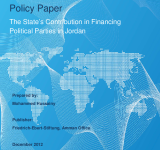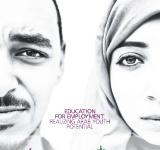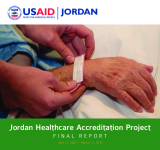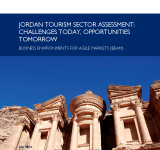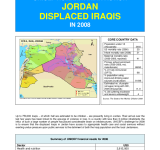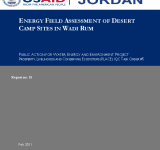This paper examines issues concerning the state's financial contribution to political parties. It argues that the weakness of parties' financial resources limits their ability to engage in political activities and elections. The purpose of this paper is thus to provide a number of options and recommendation to help decision makers form the state's system for financing political parties. It aims to provide suitable financial support for each political party;; encourage the development of political parties in Jordan;; raise the political efficiency of political parties;; develop their organizational structures;; and motivate parties to participate in political life at national and local levels. This paper analyzes the positives and negatives of four financing options and;; based on this analysis;; presents a suggested system to assist decision makers as they design the state's financing mechanism for political parties.
government
The Arab World faces extraordinary challenges. In a region with the world's highest youth unemployment rate;; millions are frustrated by their job prospects – a frustration born of education that often leaves them unprepared for the marketplace. This report shows that the private sector can be a powerful force for positive change by complementing public efforts to ensure that the region's youth gain the right skills for the jobs being created.
The report aims to provide an executive summary and major results and accomplishments;; lessons learned and challenges and opportunities of the Jordan Healthcare Accreditation Project (JHAP). The overall goal of the JHAP was to improve the health status of all Jordanians and quality and safety of healthcare services through accreditation. The project's methodology was assisting the Government of Jordan to adopt a regulatory framework for the health sector;; through the establishment of national and internationally recognized healthcare standards and accreditation. The key results of the project include an organizationally and financially sustainable accrediting agency in Jordan;; the Health Care Accreditation Council (HCAC);; an HCAC board with the appropriate skills to govern the agency and support from the Ministry of Health;; the Royal Medical Services;; the university hospitals;; and the Royal Court for accreditation. The report concludes with recommendations for the HCAC in areas such as financial sustainability;; credibility of the organization;; keeping the momentum and new business development and innovation. Some opportunities that the report suggests include expanding in the Middle East and North Africa region;; partnering with well-known quality organizations;; offering courses online and benchmarking subscriptions.
The tourism sector assessment report examines critical questions related to Jordan's best opportunity areas for tourism development growth that will result in increasing tourism receipts;; private-sector investment in tourism;; and tourism-related employment. The report identifies global trends;; best practices;; and benchmarks shaping tourism demand and competitiveness. It also suggests approaches for expanding tourism in key Jordan governorates and secondary destination in ways that benefit local communities. According to the assessment;; Jordan is well-positioned to move from a regional;; multi-country tourist destination to a stand-alone destination with a portfolio of tourism products with year-round appeal for foreign and domestic visitors;; and this will require a long-term commitment from both public and private stakeholders. It suggests collaboration between Jordan's government and private sector;; localized and inclusive economic development implementation strategies and increase in the supply of skilled tourism workforce professionals.
The aim of the report is to identify the critical issues of the Iraqi refugees in 2008;; especially the vulnerable groups of children and women and their humanitarian needs. The report examines the lack of legal framework in Jordan to identify the status of Iraqi refugees and obtain quantitative information about them. Additionally;; it looks at other urgent issues including unemployment;; lack of access to education and health care and high level of post-traumatic stress syndrome among the refugees. The report summarizes key actions and achievements of the UNICEF in 2007. It also includes the organization’s plans for the humanitarian action in areas of health and nutrition;; education;; and child protection in the following year in response to the urgent issues.
The report is based on a field assessment of 16 desert campsites in the city of Aqaba – Wadi Rum and Dieseh districts to evaluate these camps’ energy needs and their current energy situation. As part of the Public Action for Water;; Energy and Environment Project (PAP);; a public education and behavior change communication program developed to support USAID’s technical and policy investments in the Jordanian water and energy sectors;; the report assesses the current government policies and behaviors related to the issues of water;; solid waste and energy at campsites in Wadi Rum and Dieseh. The fieldwork of the report was designed to assess current campsites’ situation and energy profile;; evaluate how to reduce their energy needs;; and assess the possibility of installing renewable energy for electricity. The report concludes with several recommendations such as the enhancement of energy efficiency;; re-design of the electrical lighting systems;; re-wire of the electrical circuits;; and enforcement of laws and regulations.
وجه هذا التقرير إلى لجنة سيداو من أجل توفير أحد المعلومات وأكثرها دقة;; بالإضافة إلى دراسة وتحليل السياسات الإيجابية والتشريعات المتخذة في سبيل تقدم ونهوض المرأة وإيجاد مواطن الضعف التي تعمل على تأخير التطور;; وتساه مفي تعزيز التفاوت وعدم المساواة. ويتكون التقرير من ستة مكونات رئيسية: 1. تحفظات الأردن على اتفاقية سيداو;; 2. مواءمة اتفاقية سيداو مع التشريعات الوطنية;; 3. التمثيل السياسي للنساء;; 4. العنف ضد النساء;; 5. الحقوق المتساوية للنساء في العائلة;; 6. أوضاع النساء الضعيفات والمهمشات. ويوفر التقرير تقييماً شاملا للمكونات الستة وذلك من خلال تقييم الجهود الرسمية في سبيل تطبيق اتفاقية سيداو;; وتقييم جهود المجتمع المدني تجاه رصد مراقبة التزام الأردن بالمواثيق الدولية;; إلى جانب تقديم توصيات مقترحة للملاحظات الختامية الجديدة.
This report addressed CEDAW Committee by providing a solid and up-to-date information set and analysis of positive policies and legislation taken for women’s advancement and weaknesses that are delaying progress and sustaining disparities. The report covers six components: 1. Jordan’s reservations on CEDAW;; 2. Harmonization of CEDAW into legislation;; 3. Political representation;; 4. Violent against women;; 5. Equal rights in the family;; 6. Conditions of vulnerable and marginalized women. It also provides an overall assessment of the six components covering 3 areas: assessment of the official efforts towards the implementation of CEDAW;; also;; assessment of the civil society efforts and strategies towards monitoring Jordan’s commitment to obligations;; and suggested recommendations for the new concluding observations.
